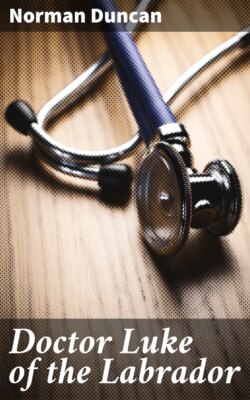Читать книгу Doctor Luke of the Labrador - Duncan Norman - Страница 6
На сайте Литреса книга снята с продажи.
OUR HARBOUR
ОглавлениеTable of Contents
A cluster of islands, lying off the cape, made the shelter of our harbour. They were but great rocks, gray, ragged, wet with fog and surf, rising bleak and barren out of a sea that forever fretted a thousand miles of rocky coast as barren and as sombre and as desolate as they; but they broke wave and wind unfailingly and with vast unconcern—they were of old time, mighty, steadfast, remote from the rage of weather and the changing mood of the sea, surely providing safe shelter for us folk of the coast—and we loved them, as true men, everywhere, love home.
“ ’Tis the cleverest harbour on the Labrador!” said we.
When the wind was in the northeast—when it broke, swift and vicious, from the sullen waste of water beyond, whipping up the grey sea, driving in the vagrant ice, spreading clammy mist over the reefs and rocky headlands of the long coast—our harbour lay unruffled in the lee of God’s Warning. Skull Island and a shoulder of God’s Warning broke the winds from the north: the froth of the breakers, to be sure, came creeping through the north tickle, when the sea was high; but no great wave from the open ever disturbed the quiet water within. We were fended from the southerly gales by the massive, beetling front of the Isle of Good Promise, which, grandly unmoved by their fuming rage, turned them up into the black sky, where they went screaming northward, high over the heads of the white houses huddled in the calm below; and the seas they brought—gigantic, breaking seas—went to waste on Raven Rock and the Reef of the Thirty Black Devils, ere, their strength spent, they growled over the jagged rocks at the base of the great cliffs of Good Promise and came softly swelling through the broad south tickle to the basin. The west wind came out of the wilderness, fragrant of the far-off forest, lying unknown and dread in the inland, from which the mountains, bold and blue and forbidding, lifted high their heads; and the mist was then driven back into the gloomy seas of the east, and the sun was out, shining warm and yellow, and the sea, lying in the lee of the land, was all aripple and aflash.
When the spring gales blew—the sea being yet white with drift-ice—the schooners of the Newfoundland fleet, bound north to the fishing, often came scurrying into our harbour for shelter. And when the skippers, still dripping the spray of the gale from beard and sou’wester, came ashore for a yarn and an hospitable glass with my father, the trader, many a tale of wind and wreck and far-away harbours I heard, while we sat by the roaring stove in my father’s little shop: such as those which began, “Well, ’twas the wonderfullest gale o’ wind you ever seed—snowin’ an’ blowin’, with the sea in mountains, an’ it as black as a wolf’s throat—an’ we was somewheres off Cape Mugford. She were drivin’ with a nor’east gale, with the shore somewheres handy t’ le’ward. But, look! nar a one of us knowed where she were to, ’less ’twas in the thick o’ the Black Heart Reefs. …” Stout, hearty fellows they were who told yarns like these—thick and broad about the chest and lanky below, long-armed, hammer-fisted, with frowsy beards, bushy brows, and clear blue eyes, which were fearless and quick to look.
“ ’Tis a fine harbour you got here, Skipper David Roth,” they would say to my father, when it came time to go aboard, “an’ here, zur,” raising the last glass, “is t’ the rocks that make it!”
“T’ the schooners they shelter!” my father would respond.
When the weather turned civil, I would away to the summit of the Watchman—a scamper and a mad climb—to watch the doughty little schooners on their way. And it made my heart swell and flutter to see them dig their noses into the swelling seas—to watch them heel and leap and make the white dust fly—to feel the rush of the wet wind that drove them—to know that the grey path of a thousand miles was every league of the way beset with peril. Brave craft! Stout hearts to sail them! It thrilled me to watch them beating up the suddy coast, lying low and black in the north, and through the leaden, ice-strewn seas, with the murky night creeping in from the open. I, too, would be the skipper of a schooner, and sail with the best of them!
“A schooner an’ a wet deck for me!” thought I.
And I loved our harbour all the more for that.
Thus, our harbour lay, a still, deep basin, in the shelter of three islands and a cape of the mainland: and we loved it, drear as it was, because we were born there and knew no kinder land; and we boasted it, in all the harbours of the Labrador, because it was a safe place, whatever the gale that blew.
